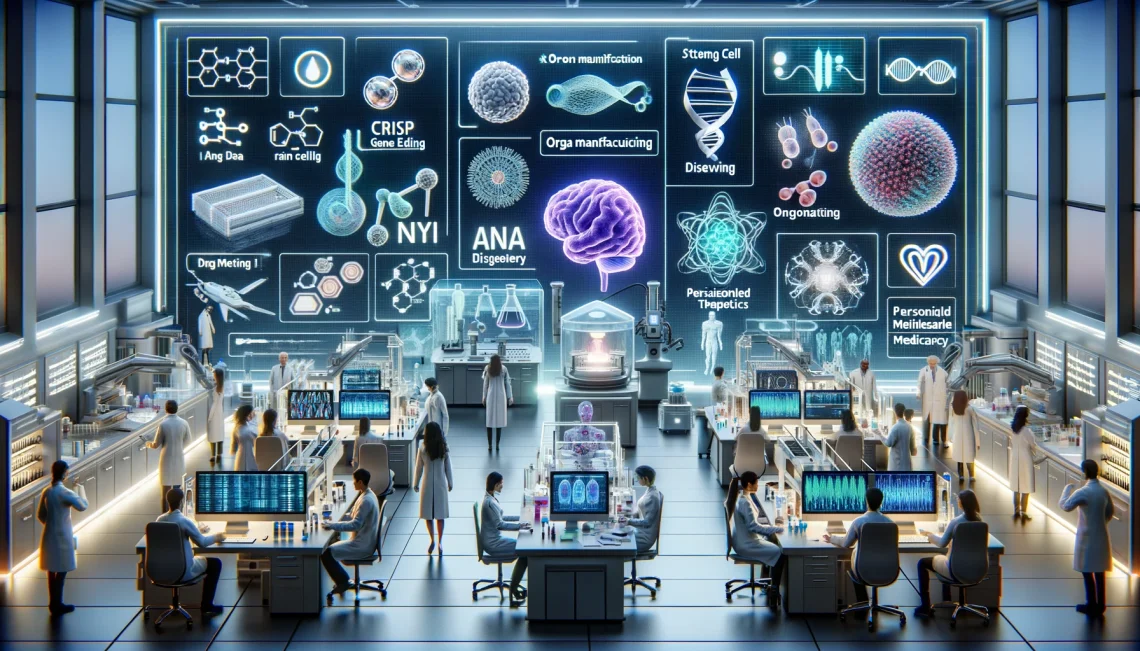
Investing in 2024: Part 3 Biotech
In part 3 of my series about investment opportunities in modern technology, I will focus on Biotech.
Biotechnology, a field once limited to laboratories and research papers, is now at the forefront of a revolution that promises to redefine medicine, agriculture, and many other aspects of our lives.
In the next section I will highlight emerging technologies in biotechnology and list some related companies. I didn’t do any detailed research one those companies in regards to market share, profitability, competition, funding, cash flow and so on. So make sure you do your own research before investing in any of these companies.
CRISPR: The Precision Tool for Genome Editing
CRISPR (Clustered Regularly Interspaced Short Palindromic Repeats) is a groundbreaking technology that allows scientists to edit genes with unprecedented precision, efficiency, and flexibility. Discovered in bacteria as a defense mechanism against viruses, CRISPR can be programmed to target specific DNA sequences, enabling the correction of genetic defects, the study of gene functions, and the development of disease-resistant crops. The potential benefits include curing genetic disorders, creating more resilient food sources, and advancing our understanding of gene functions.
Related companies
- CRISPR Therapeutics (CRSP)
- Intellia Therapeutics (NTLA)
Stem Cell Manipulation: Regenerating Tissues and Organs
Stem cell manipulation involves the use of pluripotent stem cells, which can differentiate into any cell type, to repair or replace damaged tissues and organs. Techniques such as induced pluripotent stem cells (iPSCs) allow scientists to reprogram adult cells into a pluripotent state. This technology holds promise for treating conditions like Parkinson’s disease, spinal cord injuries, and heart disease by regenerating affected tissues, potentially leading to breakthroughs in regenerative medicine and transplantation.
Related companies
- Garuda Therapeutics
- Vericel (VCEL)
AI in Drug Discovery: Accelerating the Path to New Medicines
Artificial Intelligence (AI) is transforming drug discovery by analyzing vast datasets to identify potential drug candidates more quickly and accurately than traditional methods. AI algorithms can predict how different molecules will interact with targets in the body, optimize drug design, and streamline clinical trials. This approach not only reduces the time and cost of bringing new drugs to market but also enhances the likelihood of discovering effective treatments for complex diseases such as cancer and Alzheimer’s.
Related companies
- Recursion (RXRX)
Synthetic DNA: Writing New Biological Codes
Synthetic DNA technology involves designing and creating artificial DNA sequences that can be inserted into organisms to bestow new traits or capabilities. This can be used to produce biofuels, improve crop yields, or create organisms with novel properties. By enabling precise control over genetic information, synthetic DNA has the potential to revolutionize biotechnology applications, from industrial manufacturing to environmental conservation.
Related companies
- Twist Bioscience (TWST)
- Genscript Biotech Corporation (SEHK: 1548)
- Bio Basic
- Eurofins Genomics
- Agilent (A)
- Thermo Fisher Scientific (NYSE: TMO)
RNA-Targeted Therapeutics: Modulating Gene Expression
RNA-targeted therapeutics are a class of drugs designed to interfere with the RNA molecules that translate genetic information into proteins. Techniques such as RNA interference (RNAi) and antisense oligonucleotides can silence or modify the expression of specific genes. These therapies offer a way to treat diseases caused by the over-expression or mutation of particular genes, providing new avenues for conditions like muscular dystrophy, amyloidosis, and certain cancers.
Related companies
- Ionis Pharmaceuticals (IONS)
- Elpida Therapeutics
- Sarepta Therapeutics (SRPT)
- Alnylam Pharmaceuticals (ALNY)
Organ Manufacturing: Creating Organs from Scratch
Organ manufacturing, also known as bio-printing or tissue engineering, involves using 3D printing technology to create organs and tissues from biocompatible materials and living cells. This innovation aims to address the shortage of donor organs for transplantation. By creating custom organs tailored to each patient, organ manufacturing could revolutionize transplant medicine, reduce the risk of organ rejection, and save countless lives.
Related companies
Personalized Medicine: Tailoring Treatment to the Individual
Personalized medicine leverages genetic, environmental, and lifestyle information to tailor medical treatments to individual patients. By understanding a person’s unique genetic makeup, doctors can predict how they will respond to specific treatments, identify the best therapeutic options, and minimize adverse effects. This approach enhances the efficacy of treatments for conditions such as cancer, cardiovascular diseases, and rare genetic disorders, leading to more precise and effective healthcare.
Related companies
- AC Immune (ACIU)
- Alto Neuroscience
- Biomea Fusion (BMEA)
- Engine Biosciences
- ReCode Therapeutics
- Scorpion Therapeutics
- SpringWorks Therapeutics (SWTX)
Gene Therapies: Correcting Genetic Defects
Gene therapy involves introducing, removing, or altering genetic material within a patient’s cells to treat or prevent disease. Techniques like viral vector delivery and CRISPR-based editing allow for the correction of genetic mutations at their source. Gene therapies hold the promise of curing inherited disorders, such as cystic fibrosis and hemophilia, and providing long-term solutions for chronic conditions, fundamentally changing the landscape of genetic medicine.
Related companies
- Beam Therapeutics (BEAM)
Disclaimer
While Biotech presents exciting investment opportunities, this is not investment advice. Investments are always at your own risk. It’s crucial to do your own research and consider your financial situation before investing.


